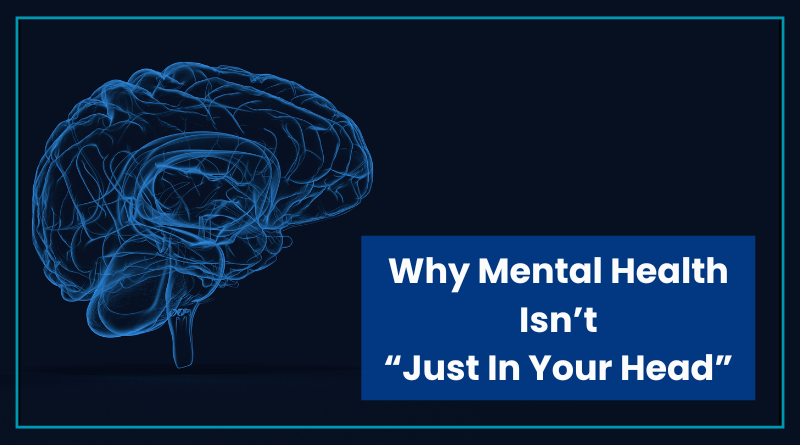How Your Microbiome Affects Your Mood in the Corporate World
Feeling overwhelmed by stress and low mood at work? You might be surprised to learn that the key to a more balanced outlook could lie not just in your head, but also in your gut. Recent research sheds light on the fascinating connection between the gut microbiome and the brain, often referred to as the “gut-brain axis.” This intricate communication highway plays a significant role in regulating mood, and disruptions in this axis have been linked to the development of depression. In this article, we’ll explore how the gut and food can impact mental well-being, and offer practical strategies for corporate professionals to nurture their gut health and combat feelings of depression through dietary and lifestyle changes.
Let’s delve into a topic critical for all of us, especially those navigating the often-stressful world of corporate life: mental health.
Statistics tell a concerning story of unprecedented workplace stress.
- In the USA, 83% of US workers suffer from work-related stress1
- In the UK, 51% of adults who felt stress reported feeling depressed and 61% reported feeling anxious2
- In Australia, 68.5% of Australian works felt like they were burning out at work3
We spend a significant portion of our lives working, and the pressure to perform can take a toll on our well-being. But what if I told you that mental health isn’t just about “thinking positive”?
For years, the traditional approach to mental health focused primarily on cognitive behavioural therapy (CBT) and positive thinking. While these strategies have their place, they often overlook a crucial aspect of the equation: the powerful connection between our gut and our brain.
This might sound surprising, but there’s a fascinating biological highway called the gut-brain axis. It’s a two-way communication system between the trillions of bacteria living in our gut (the gut microbiome) and our brain. These gut microbes play a surprising role in producing neurotransmitters like serotonin and dopamine, which significantly impact our mood, focus, and overall well-being. Here’s where things get interesting – chronic stress, a common companion in corporate environments, can wreak havoc on our gut health. The constant pressure, poor dietary choices due to busy schedules, and lack of sleep can disrupt the delicate balance of our gut microbiome. This disruption then feeds back, affecting our mental well-being and potentially exacerbating stress and anxiety. It’s a vicious cycle.
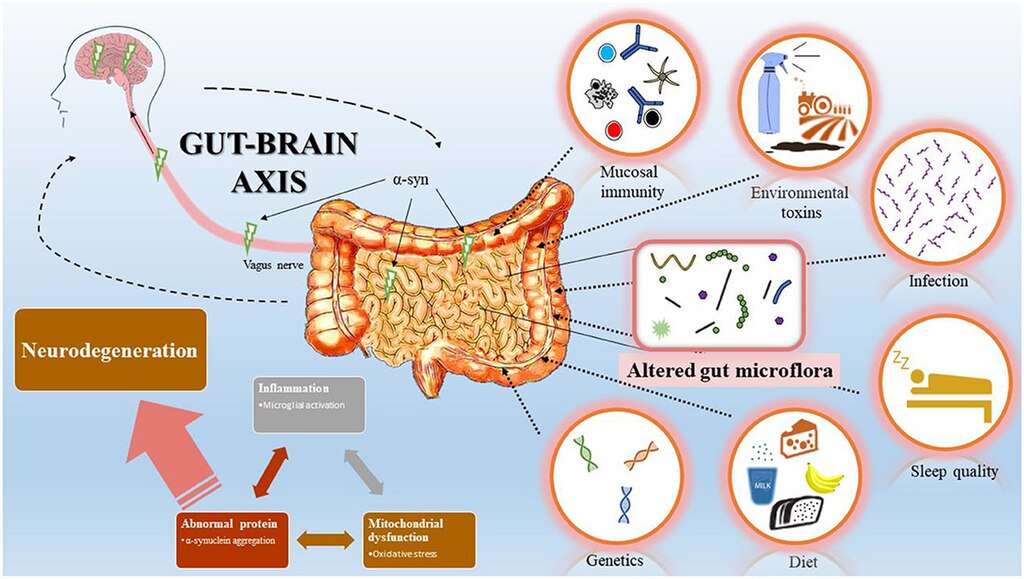
Image from Chao Yin-Xia, Gulam Muhammad Yaaseen, Chia Nicholas Shyh Jenn, Feng Lei, Rotzschke Olaf, Tan Eng-King, CC BY 4.0 <https://creativecommons.org/licenses/by/4.0>, via Wikimedia Commons
The Vagus Nerve: A Mastermind of Communication
Often referred to as the “wandering nerve” due to its extensive reach throughout the body, the vagus nerve is the longest cranial nerve. The vagus nerve goes from your brain and runs on either side of your the neck and then descends down through the thoracic area into an extensive network covering the whole abdominal area. It plays a vital role in the parasympathetic nervous system, which is responsible for our “rest and digest” response.
In the context of the gut-brain axis, the vagus nerve acts as the main communication channel:
- Gut to Brain:
- The vagus nerve carries signals from the gut microbiome (the trillions of bacteria residing in your digestive system) to the brain. These signals inform the brain about digestion, nutrient absorption, and even the emotional state of the gut (influenced by the microbiome).
- This gut-to-brain communication allows the brain to regulate gut functions like motility (muscle contractions that move food through the digestive tract) and secretion of digestive enzymes.
- Brain to Gut:
- The vagus nerve also carries signals from the brain to the gut.
- During times of stress, the brain diverts energy from digestion to your heart and muscles so you can fight or flee. If you’re constantly stressed, this could lead to digestive issues like stomach upsets or constipation.
- Conversely, the vagus nerve can be stimulated through relaxation techniques like deep breathing, sending calming messages to the gut and promoting a sense of well-being.
The Vagus Nerve and Mental Health
The vagus nerve’s role in the gut-brain axis extends beyond just digestion. It’s increasingly being recognized for its potential influence on mental health:
- The gut microbiome is involved in the production of neurotransmitters like serotonin, which plays a role in mood regulation. Fun Fact: Most of the body’s serotonin (around 90%) is actually produced in the in the lining of your gastrointestinal (GI) tract, particularly in the small intestine. By facilitating communication between the gut and brain, the vagus nerve can indirectly influence mood and emotional state.
- Chronic stress can negatively impact gut health and disrupt the signals traveling through the vagus nerve. This can contribute to anxiety and worsen existing mood disorders.
Supporting Vagus Nerve Function
While research is ongoing, here are some ways to potentially support healthy vagus nerve function:
- Stress Management Techniques: Practices like deep breathing, meditation, and yoga can activate the parasympathetic nervous system and promote vagus nerve activity. As the vagus nerve goes through your neck, activities like singing, shouting, yawning, even gagging, will activate the vagus nerve. A very subtle technique you can use in the office is to gently rub the soft area just behind the earlobe.
- Gut-Friendly Diet: Nourishing your gut microbiome with prebiotics (found in fiber-rich fruits and vegetables) and probiotics (fermented foods) can contribute to a healthy gut-brain connection.
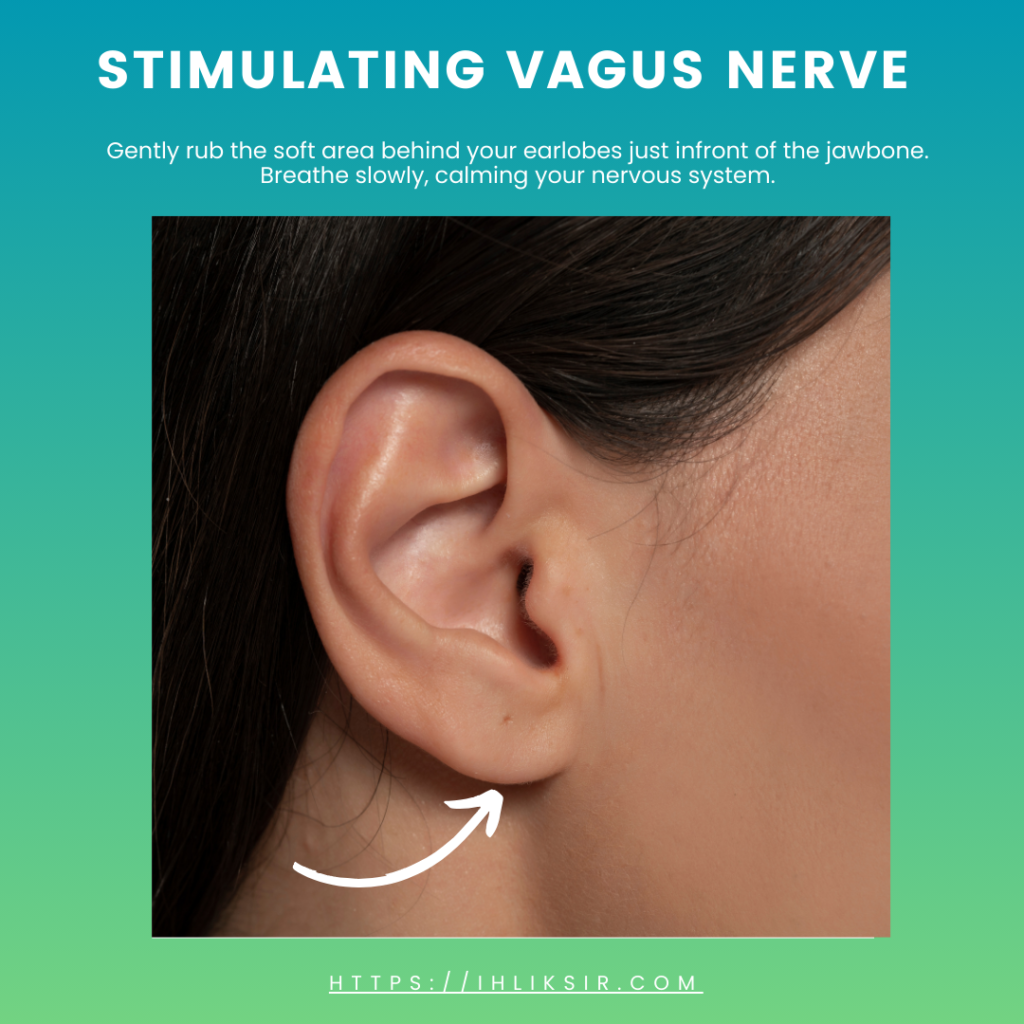
Diet
The foods we choose not only impact our physical health but also play a surprising role in our mental well-being.
We’re talking about prebiotics (think fiber-rich fruits and vegetables) that feed the good bacteria in our gut, probiotics (like fermented foods) that introduce beneficial bacteria strains, and omega-3 fatty acids (found in fatty fish) that have well-documented benefits for brain function. B vitamins and amino acids also play a crucial role in neurotransmitter production, and leafy greens and nuts can be excellent sources.
Tryptophan
Tryptophan is one of the 20 essential amino acids that your body needs to build proteins and perform various other crucial functions. You cannot synthesize tryptophan on your own and must obtain it from your diet. Tryptophan is a precursor to melatonin, serotonin and niacin (vitamin B3). Melatonin is a hormone which regulates sleep-wake cycles. Serotonin is a neurotransmitter which plays a crucial role in mood regulation, sleep, appetite, and digestion. Niacin (vitamin B3) is essential for energy production and cellular function.
- Animal Protein Sources
- Turkey (lean cuts)
- Chicken
- Fish (especially salmon and tuna)
- Eggs
- Cheese
- Plant-Based Protein Sources:
- Tofu and tempeh (soy products)
- Nuts and seeds (pumpkin, sesame, peanuts, cashews)
- Quinoa
- Lentils and beans
- Chickpeas
- Buckwheat
Magnesium
Magnesium is a superstar mineral that plays a crucial role in over 300 bodily functions, This powerhouse mineral helps promote relaxation, improve sleep, and even combat symptoms of anxiety and depression.
Magnesium & Brain Health
- GABA Modulation: A very important neurotransmitter is gamma-aminobutyric acid (GABA), which acts like a brake on brain activity, promoting relaxation and calmness. Studies suggest magnesium deficiency can impair GABA receptor function, potentially contributing to anxiety and sleep disturbances.
- Energy Production: Magnesium is essential for converting glucose into usable energy, which is crucial for proper brain function and focus.
- Neurotransmitter Regulation: Magnesium is involved in the regulation of various neurotransmitters, including serotonin.
- Neuroplasticity: This refers to the brain’s ability to adapt and learn. Magnesium is thought to support neuroplasticity, allowing your brain to stay sharp and resilient.
Natural Sources of Magnesium
While magnesium supplements are readily available, incorporating these natural sources into your diet is a delicious way to boost your intake:
- Leafy Greens: Dark, leafy greens like spinach and kale are excellent sources of magnesium.
- Nuts and Seeds: Almonds, cashews, pumpkin seeds, and chia seeds are all packed with this beneficial mineral.
- Whole Grains: Brown rice, quinoa, and whole-wheat bread are good dietary sources of magnesium.
- Dark Chocolate: Enjoy a small square of dark chocolate (at least 70% cacao) for a magnesium boost.
- Avocado: This creamy fruit is not only delicious but also a good source of magnesium.
By incorporating a gut-friendly diet rich in tryptophan and magnesium foods, we can support our mental health. To help you get started, here are few meal ideas that incorporate these mood-enhancing, gut-friendly powerhouses. Remember, small changes can make a big difference.
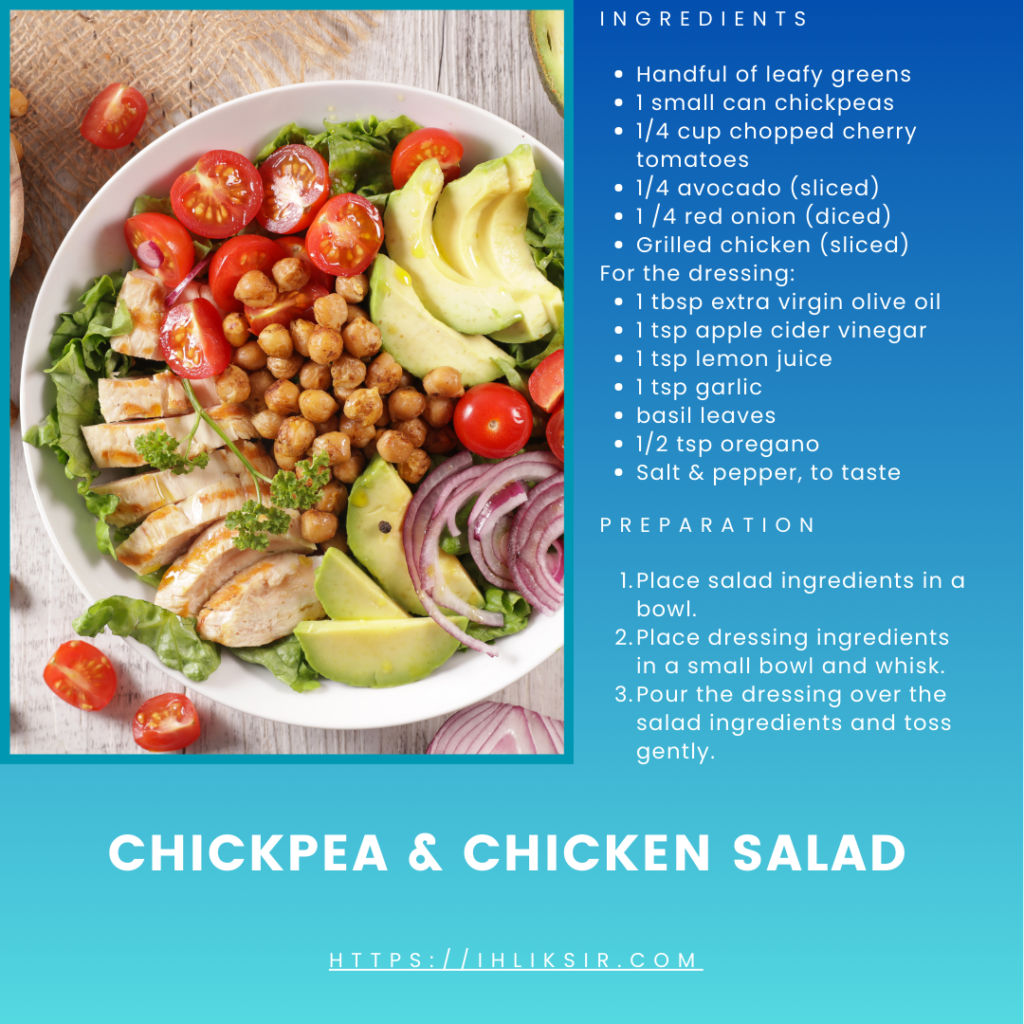

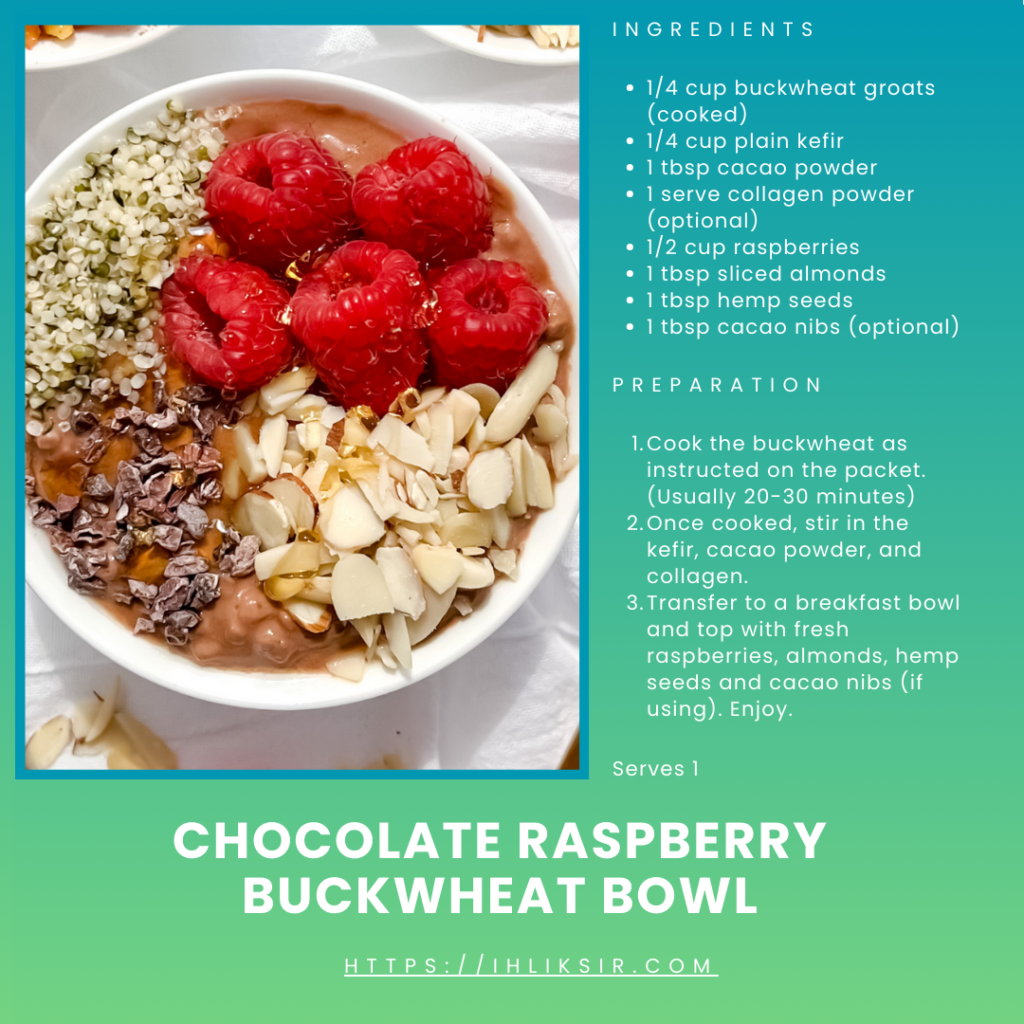
Of course, managing stress in a corporate environment can be challenging. But there are practical steps you can take to regain control. Short meditation breaks throughout the day can promote mindfulness and reduce stress. Prioritizing good sleep hygiene is crucial, and staying hydrated and mindful of your eating habits can make a world of difference. Some workplaces even offer wellness programs or benefits – take advantage of those resources! For some simple energy medicine exercises you can use to reduce stress in the office get the free Stress Relief e-book here.
The key takeaway here is that mental well-being is a complex issue with a surprising gut connection. By adopting a holistic approach that addresses both our minds and our gut health, we can create a more resilient and balanced state of being. Combining a gut-friendly diet rich in mood-boosting nutrients like tryptophan and magnesium with stress-management techniques can create a powerful synergy.
This empowers you to navigate the demands of corporate life with a sharper focus, a calmer disposition, and a more resilient sense of well-being.
If you’d like to explore further or get personalized guidance, feel free to reach out to me! In the meantime, stay tuned for upcoming blog posts where we’ll delve deeper into specific gut health and integrative health practices.
Footnotes:
- https://www.stress.org/workplace-stress#:~:text=80%25%20of%20workers%20feel%20stress,they%20fear%20could%20become%20violent ↩︎
- Mental Health Foundation and YouGov https://championhealth.co.uk/insights/stress-statistics/http://Mental Health Foundation and YouGov https://championhealth.co.uk/insights/stress-statistics/ ↩︎
- 2019 – 2022 Workplace Report by Wellbeing Lab & the Australian HR Institute et al https://www.ahri.com.au/wp-content/uploads/MMcQ_WellbeingLab_Australia_WorkplaceSurvey_2019-2022-1.pdf ↩︎
Disclaimer:
I am not a medical professional. The information provided on this website is for informational purposes only and is not intended to substitute professional medical advice, diagnoses, or treatment. Always seek advice from your physician or other qualified healthcare provider before undertaking a new health regimen.
Do not disregard medical advice or delay seeking medical advice because of information you read on this website. Do not start or stop any medications without speaking to your medical or mental health provider.
Jennifer Tak is a certified Integrative Health Practitioner & Energy Coach who helps busy professionals regain their energy and conquer stress, gently and naturally. Jennifer had over 20 years of corporate life and was stressed out and exhausted. Now she’s using her previous corporate experience, combined with her hippy inclinations with health and energy medicine to simplify health for busy people. Get a FREE copy of her Stress Relief e-Book for 15 ways to reduce your stress quickly, gently and naturally.

